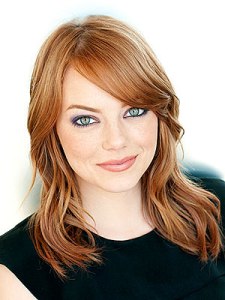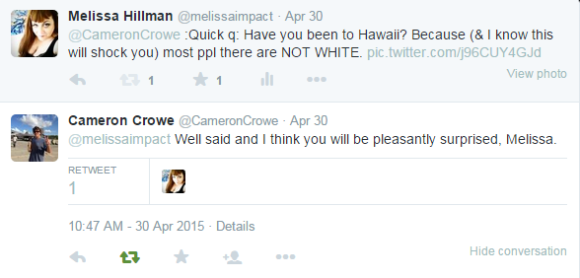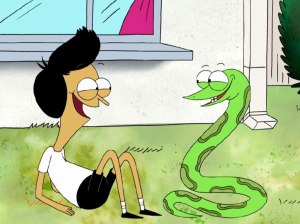About a month ago, I tweeted a little snark at Cameron Crowe about the poster for his upcoming film, Aloha. I was shocked to get a response. I wasn’t shocked, however, when the film turned out to be exactly what I thought it would be— a film about white people with some HAWAII used as, essentially, set dressing. Perhaps Crowe was assuming I might be pleasantly surprised by the inclusion of Hawaiian sovereignty activist Bumpy Kanahele (in a bit role as himself). But I think, most likely, he was assuming I’d be pleasantly surprised by the fact that one of the female lead characters is hapa, a Hawaiian term (now in common use, at least here in the Bay Area) meaning a mixed race person who is part-Asian/Pacific Islander, part-something else. The character is named “Allison Ng,” and is described as “one quarter Chinese, one-quarter Hawaiian, and one-quarter Swedish,” and one-quarter . . . ? It must be white, because white is the default position for all Hollywood casting. But still, half Asian/Pacific Islander, eh? That most certainly is a pleasant surprise!

The poster about which I snarked at Cameron Crowe. The hapa actress must have been left off the poster, right?
Wrong. I would have been pleasantly surprised if the character had been played by a hapa actress, from which there are many to choose if one cares to look. The role, however, is played by Caucasian actress Emma Stone. Cue sad trombone.

British actress Jessica Henwick. Henwick is one of many hapa actresses living and working in the world today.

Emma Stone. I pulled both these headshots from their imdb pages, and neither were credited. If anyone has photog info, let me know and I will update.
There are many reasons this casting is shocking and unacceptable. Actors of color have had to fight for centuries for the right to play characters of color, first in theatre, now in film and television. Those roles historically went to white people in some kind of “ethnic” drag– blackface, yellowface, and the like. While many argue that our most egregious examples are far in our past (such as Mickey Rooney in Breakfast at Tiffany’s) we DO still cast white actors as characters of color all the time, sometimes using makeup, and sometimes, as in this case, just putting a white person on screen or on stage as is and calling it a day. We’re also notorious for whitewashing characters– taking a pre-existing property (like a novel or a fairy tale) or real-life story and remaking it as a film or a play, but changing the people of color in the narrative to white people. If you haven’t seen playwright Prince Gomolvilas’ “21 Reasons This Movie Sucks,” about the whitewashing in the film 21, you should.
It’s shocking that whitewashing still happens so frequently in Hollywood, particularly considering the massive controversies it causes much of the time– the casting in Airbender created a firestorm back in 2010, and there have been many like controversies since (The Lone Ranger, Peter Pan, Exodus: Gods and Kings, and Ghost in the Shell are a few examples). What’s even more shocking to me personally is how often both whitewashing and yellowface (and brownface, and all permutations) happen in the theatre, even as we talk all the time about how much more progressive we are than Hollywood.
It’s depressingly common for white people to see the ability to play people of color as their due, and for white people to see their own ethnicity as a kind of “neutral.” It’s a bias (often an unconscious bias) that has enormous, far-reaching effects. A great example is how some white people react whenever a character of color is included in an otherwise very white context, or whenever a character of color is a lead in a story not specifically about their race or ethnicity. “Why does [insert name of character] have to be [insert ethnicity]?” is something I often hear, as if white is “normal” and “neutral” and anything apart from that is a particular, aggressive decision. And while it’s undeniable that race has meaning and cultural weight (which is precisely why you can cast a Black man as Hamlet but you can’t cast a white man as Othello), white people too often ONLY apply that to people of color, seeing their own race as a universally accepted neutral instead of something just as particular, but currently in a culturally dominant position.
One famous example is SLIMED! An Oral History of Nickelodeon’s Golden Age author Mathew Klickstein’s comment about current Nickelodeon show Sanjay and Craig: “That show is awkward because there’s actually no reason for that character to be Indian,” as if a character needs a particular reason to justify a lack of whiteness. Klickstein goes on to state that characters should only deviate from whiteness if the show is about ethnicity: “I think that it does the culture a disservice. If I were Indian or Jewish, for example, and watched something where the characters are Jewish or supposed to be, and if it’s not specific to that, then I start to wonder, ‘Why are they doing this?’ It becomes blackface.” Because, obviously, everything Indian or Jewish people do relates specifically to that identity. I don’t blog: I JEWBLOG. I don’t sleep: I JEWSLEEP. I don’t have adventures: I have JEWVENTURES. And if your work includes Indian or Jewish people, but is not specifically about being Indian or Jewish, it’s racist. Yeah, OK. ::eyeroll::
Anyone who doesn’t conform to straight white able-bodied average weight cisgendered Christian-heritage male (and I’m probably leaving a few out) are defined by their deviation from that “standard.” While “straight white able-bodied average weight cisgendered Christian-heritage male” refers to approximately 15% of the population (at best), we are constantly positing it as neutral– as “normal”– and anything apart from that is so wildly different, so enormously specific, we must provide a justification for its very existence.
When the culture sees white as “neutral,” is it any wonder that a white woman can be cast to play a woman of color and (almost) no one bats an eye? Emma Stone can be just “an actor” while Jessica Henwick is an “Asian actor.” I’m willing to wager Crowe didn’t even read any hapa actresses for the role of Allison Ng, and that the casting call went out asking for “Caucasian actresses, 18-24.”
It’s depressingly common for white people to brush this off with things like, “She’s half white! Why can’t a white person play her?!” as if mixed people in America are somehow fully represented by a white person; as if mixed people in America are not struggling with racism, bigotry, and other issues PARTICULAR TO THEM; as if mixed people are fair game to ERASE COMPLETELY. As if white actors are truly neutral, the universal donors of casting.
I think the thing that’s the most depressing about this is that Cameron Crowe evidently felt so confident about this hapa character that he would personally tell me that my concerns about race in his film were unfounded, and that I would be “pleasantly surprised.” He seems to actually believe that casting Emma Stone as hapa Allison Ng quells concerns about the lack of diversity in his film, rather than creates more concerns.
Why are we still making films (and theatre) where both people of color and mixed race people are erased and replaced by white people? Ridley Scott, too old and rich to pretend otherwise, flatly stated that he cast white actors instead of Middle Eastern actors as Middle Eastern characters in Exodus: Gods and Kings because otherwise, no one would fund his film. Hollywood is notoriously risk-averse, and Scott’s statement is indicative of our cultural positioning of white as “normal” and everything else as “different,” considering a white star a certain box office draw despite constant evidence to the contrary, where the same poor decision was made and the film still tanked. There’s no question racially insensitive casting can take a bite out of sales– #boycottexodus burned up my feed before the film was released. And yet the idea that white = normal = safe is so thick in Hollywood you can walk on it.
The other excuses are no better. It’s nonsense that people “don’t see race” and are just looking for “the best actors for the role.” You’ll never see a Hollywood film with Black actors as the Continental Congress– it’s not historically accurate, right? But it’s perfectly acceptable to cast a Hollywood film with all Caucasian actors as the Egyptians and Hebrews in the book of Exodus, despite the fact that those actual, historical people were Middle Eastern, not white. And of course you never see a person of color randomly cast in a film written for white actors unless that person of color is a powerful star, but you’ll see white actors who could barely be called any kind of box office draw (Mena Suvari?) cast in roles that were either meant for a person of color, or were a person of color in the original material.

Joel Edgerton, who played Pharaoh Ramses II in Exodus: Gods and Kings. Photo by Frazier Harrison/ Getty Images
As long as we continue to see white as “neutral,” we’re going to see directors casting white actors as people of color and feeling perfectly justified. We’ll continue to see white people getting huffy about their right to play these roles. We’ll continue to see white people try out deflection techniques like, There are so many more IMPORTANT things in the world! (If that’s the criteria, we’ll never get to talk about anything except literal genocide. And of course every person who makes that statement has just finished posting a dozen pictures of their kid, or three paragraphs about their diet. Because IMPORTANT.) As long as we continue to see white as “neutral” and “normal,” we’ll continue to see people of color ignored and erased.
So, Cameron Crowe, I’m not at all surprised, pleasantly or otherwise.
UPDATE 6/3/15:
Cameron Crowe posted a semi-apology on his blog for casting Emma Stone as Allison Ng. Tl;dr: “Sorry if you thought I effed it up; I based it on a real, redheaded 1/4 Hawaiian person; I added another 1/4 API ancestry because diversity; Emma Stone did lots of research.” So basically: “Sorry if you objected, but I’m still right.”
Evidently he never stopped to consider that he had created a character who was 1/2 API, making it unrealistic that she be played by a white actress. I understand that “unrealistic” isn’t a major concern for Hollywood, but race and representation matter in ways that shitty narrative do not.
It’s a very typical kind of half-apology issued when people in power are caught with their pants down. BUT. It’s heartening that he understands that he WAS caught with his pants down, at least. Baby steps.



I took a workshop with Lee Blessing a few years back. He actually asked one playwright, “How does it help your play that that one character is Chinese?”
I still regret that I didn’t ask something innocent like, “How does it help her play that that one character is white?”
I’m white passing.
I wrote a screenplay in Creative Writing my junior year where the lead characters were a Korean man and a Mexican woman. It was a love story where they meet once on a train to Calexico then again as ghosts after death. The story mainly focused on conversations and there was no sex anywhere in the script. When I received the script back the professor asked me “Why is he Asian? Does she have a fetish?” And he said if I fixed the “problems” with the story, it could go from an B to an A. I changed the Korean into a Christian white American, and the Mexican woman to a Jewish Ukrainian. I got an A.
But somehow I just ended up feeling like I failed.
YES! Well said. Here’s a poem I wrote about this some time ago
http://claudiaalick.blogspot.com/2014/03/you-are-not-green-screen.html?m=1
Every time I see news about this movie, I’m posting the following orgs that support films that show Hawaii and its people are more than just backdrop. I’ll be donating some of my summer movie money to the following organizations, so hopefully one day, movies like “Aloha” will be the rare (and bizarre) exception instead of the norm. Hope others will join me in doing so.
http://www.piccom.org/ – Pacific Islanders in Communications
http://www.hiff.org/ – Hawaii International Film Festival
It was not perfect by any means but back in the day, the original Hawaii 5-0 did tend to use local Hawaiian people– cast in roles and as crew, which is reflected in the credits.
Reblogged this on The Memetrix.
I cannot upping this enough.
Absolutely right, Melissa. so glad you posted this.
hi there! love the post. actual Cali-born hapa here with an important correction: you don’t have to be “half white” to be hapa — just mixed Asian/Pacific Islander. would love to see that edited so that people who are unfamiliar with hapas don’t get even more confused when they meet one of us that doesn’t fit what they’ve read here…
Will do! I’ve grown up with the term here in the Bay Area, and I’d always heard it used to describe someone half API/half white. This is a great example of my own internal bias– I assumed I knew what the word meant from my own limited experience and didn’t do any further research, even though I’m not hapa myself. Thanks so much for pointing this out, and I will correct it immediately.
Hapa has a deeper history, and has specific connotations…in particular, Native Hawaiians have objected to its use in several contexts.
A much better description than I can provide is here: http://aapivoices.com/hapa-with-care/
thanks!
“You’ll never see a Hollywood film with Black actors as the Continental Congress– it’s not historically accurate, right?”
And that’s why I jumped up and down when “Hamilton” has become so popular Off-Broadway- and will be moving to Broadway. I dream of it being filmed.
ME TOO!!!
The sad thing is that if you look at Hawaii 5-0, they have a mixed cast, though the main leads are white guys. There is a way to do it without completely whitewashing the cast.
I was thinking of that show too when I started hearing about this. It’s actually not hard to list actors who would be good. Grace Park, for example. She’d could have rocked it and it would break her out even more.
Why do we worry about color at all when casting in theatre or movies….or for that matter in real life? What does color have to do with talent? And just because a particular piece was written in all white because that was the way things were at that time….why not just embrace to world as it really is. The world was not all white…..ever. Are we not just perpetuating the myth? Are we not promoting passive racism?
I’m sure you meant well by this comment but I think you’re speaking from a place of privilege.
Melissa went into this but it always bears repeating. Race and color DOES matter for the following reasons:
1) because for millions of people across the world, they are constantly reminded that they are less than or different because they don’t fall into the white/Christian/heterosexual/cis-male (and able-bodied) standard of “normal,” which stems from centuries of systematic oppression where anyone who didn’t fall into those categories were not considered human.
2) because of this “normative,” Hollywood and the media at large has a long and continuous history of white-washing, cultural appropriation, and erasure of important narratives of other races, religions, genders, sexualities, and experiences. Simply put, it CAN’T be just about talent because of the incredible amount of difficulty that actors who are not thin, white, cis, etc., have to just be seen in the casting room. It can only be truly about talent once we have a truly equal playing field, and while we’ve made strides, we’re nowhere near that yet.
3) because if you believe art is supposed to reflect society, then the mainstream media needs to be more cognizant of better representing the myriad of different experiences within this country. As Melissa said, only 15% of the country’s population is white and male, yet that makes up the majority the narratives being released in mainstream TV, film, and theater.
Don’t we all deserve to see ourselves being represented in our country’s art? Being an Asian female myself, I can’t tell you the significance of discovering Margaret Cho when I was a teenager. As a little girl, I clung to my Asian Barbie doll for dear life, I was thrilled when Mulan came out. I was different and an outcast my whole life, so seeing someone who looked like me on the big or small screen reminded me that I wasn’t a total freak of nature, I wasn’t alone. That I MATTERED.
4) because don’t you want to learn about other cultures? Other people’s experiences outside of your own? Aren’t you sick of hearing and seeing the same stories over and over again? I know I do. I know I am.
5) Why the heck not? What do you have against talking about, addressing, and acknowledging race? Because for most of us, it IS a big part of our lives. Not because we necessarily want it to be (that’s the difference between nationality/heritage and race in my opinion) but because we live in a world where we’re constantly reminded of it, treated differently or unjustly because of it, and suffer for it. So YEAH. Let’s talk about it.
I am a playwright living in New York. One show I wrote called for ensemble of “all ethnicities and genders.” Unfortunately we only had 2 African American actors show up for the audition, and we were not able to cast them because of ability; we did manage to have a diverse cast that included two Asian actors. The current production of my show was able to cast a wonderfully diverse cast, but this production offered a little larger stipend and full production credits. My point is that in theatre, casting can be hit or miss and dependent upon several factors such as ability, compensation (not everyone can work for pennies on the hour), and just plain who shows up at the audition. There happens to be a lot more white girls trying to make it in musical theater than any other type. But we do try to look for diversity. At least I do. I love to see talent, and once I didn’t even notice the girl we cast was part Asian. She was great singer, beautiful with a brilliant smile; I that’s all I saw. Honestly.
They should have gotten Rob Schnieder to play all the parts! He’s part asian AND he was great as an animal, girl, gigilo, stapler, carrot and Derp!!!!
Your narrow-minded view and blatant racism shines through here. If race was irrelevant (as for me it is) you wouldn’t of typed up this incredibly ignorant diatribe illustrating your racism towards white people particularly white- males. Hop off your pseudo-feminist soap box and go treat yourself to a soothing Horlicks.
Hey Doc, Marty needs you to fire up the Delorean so you can get Back to the Present.
Wow. If there were ever a more perfect display of white male privilege than Doc’s reply, and the blindness it encompasses, I don’t think I’ve seen it. And I say this as a straight white able-bodied cis-gendered Christian-heritage male…
And there it is. You couldn’t care less about racism, you just needed to get a ridiculous jab in about “feminism.”
What is it like in your world where all women are just waiting to go after you because your a man? I mean, instead of going after you because you’re a horrible excuse for a human, that is.
The author has a very, very legitimate point—-one you skipped right over because you scrolled directly down to the comments to whine and cry about perceived feminism. It’s pathetic, it’s sad, and it’s wholly to be expected from an ignorant tool who likely has a cache of websites and blogs he frequents—typical MRA stuff. So congratulations, you’re a cliche.
Are you for real?
Troll much?
A brilliant analysis, as usual, BG– tangentially, I just watched Big Hero 6 with a group of 14 year olds, and I was impressed with the film’s diversity for its characters, AND the lack of reference to any said diversity– it was all just there, accepted as normal and not worth mentioning. Loved it, hope we get a sequel despite the lackluster BO for the first one… That being said, I’m about to cast Clybourne Park and am desperately seeking Af-Am actors for two roles– why is it so hard in this region? Not about to give up, just surprised that I’m having difficulty… I can see this being a factor in theaters, those that DO give up, or maybe don’t even try– but no excuses for Hollywood…
I like this related article, too: http://www.thedailybeast.com/articles/2015/05/28/the-unbearable-whiteness-of-cameron-crowe-s-aloha-a-hawaii-set-film-starring-asian-emma-stone.html
Reblogged this on KURLFRIENDS and commented:
Not hair related specifically but culturally relative definitely!
The reason is unfortunately simple. The film industry is a business and stars are bankable commodities that will attract more viewers (i.e. buyers) than ethnically accurate actors (i.e. nonprofessional performers who aren’t stars).
But it’s not that simple. I think Melissa touched on this (and in other blog posts) but it goes deeper than that. Why do you think the majority of big stars in the film industry are thin, white, cis, and able-bodied? It doesn’t accurately reflect our actual population or the average American experience, but it DOES reflect accurately the power structure in our current (and past) society. It’s all connected.
The simple answer is often the wrong answer.
Besides, your answer “ethnically accurate actors (i.e. nonprofessional performers who aren’t stars)” is monstrously insulting and monstrously racist.
Try again? And add a few IQ points, please?
Gods and kings was a David Carradine Kung Fu type crap. ALoha is hiring your own and stacking your deck with box office draws.. I’d like to see more minority producers and will take care of it.
People who use terms like “cisgendered” all speak as if they were cloned from the same master cell and get shrill over the same predictable things. #firstworldproblems
Seriously? That’s such a dismissive blanket statement. Do you know any trans* people? It’s not just a trendy topic. They are real people and face real discrimination and even daily life-threatening danger because of who they are. Cis-gender is the politically correct term and quicker than saying “biologically female” or whatever. I think we’re just all trying to be respectful of other people’s experiences.
REALLY?
You really don’t get out much, do you? Or meet people different from you?
Wanna try again? Without the foot in mouth?
This article states that a major problem with Crowe’s casting is that Stone isn’t “visibly hapa.” Something that most hapas go through is racial policing, for example, in the case of a mixed white-Asian person, when someone tells you that you don’t look “white enough” or “Asian enough.” I am hapa with white heritage, but I pass for monoracial Asian with many people. Oftentimes, people have acted with surprise or even indignation after I’ve told them that I’m white in addition to my Asian background. Ideally, someone who looks like me should be able to be accepted as hapa without question.
Conversely, a hapa who passes as monoracial white should be able to be accepted as a person of Asian heritage without question. This brings me to my point: we should be careful when we say that the problem with Stone’s character is that she doesn’t “look hapa enough” or isn’t “visibly hapa.” Certainly, there are problems in Crowe’s casting, but debates of phenotype and racial policing are potentially hazardous.
These are excellent points. The character is specifically 1/2 Asian/Pacific islander, 1/2 white. The blog “Fairy Princess Diaries,” by Erin Quill, covers the topic of phenotype in depth: http://fairyprincessdiaries.com/2015/06/02/skipping-emma-stones-au-revoir-aloha-eating-cameron-crowe/
My favorite part of this post: “I don’t blog: I JEWBLOG. I don’t sleep: I JEWSLEEP.” I laughed out loud because it’s such an accurate representation of the backwards thinking that makes racial equality an ongoing struggle in our society. I appreciated the sarcastic illustration of the thinking that goes on and hope I can help my own community overcome their inaccurate illusions of racial differences.
Just a thought…if your logic stands, Hamlet was a Danish prince. But it’s appropriate- based on your other assertions- to cast a Black actor as Hamlet?
There are many excellent articles on this if you’re honestly interested in knowing the answer and not just trolling. Basically, it’s because both racial narratives and cultural context will impact a piece’s dramaturgy. If you’re interested in knowing more, you can find a thorough explanation in one of my 2013 articles: https://bittergertrude.com/2013/02/13/in-the-land-of-the-color-blind/
I’m very interested and not at all attempting to troll- that was a bit snarky. I just really don’t get that logic. I’ll happily read your article. Thanks!